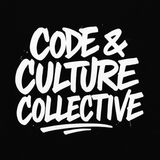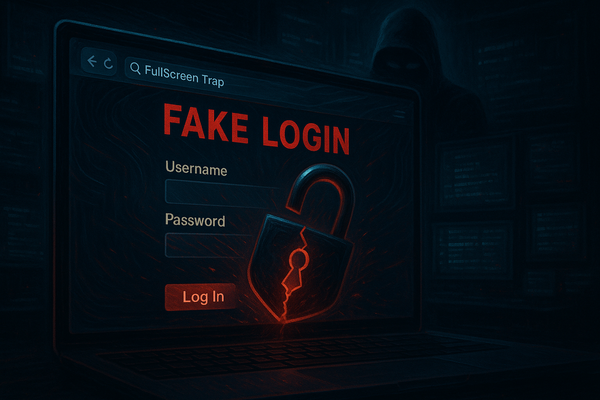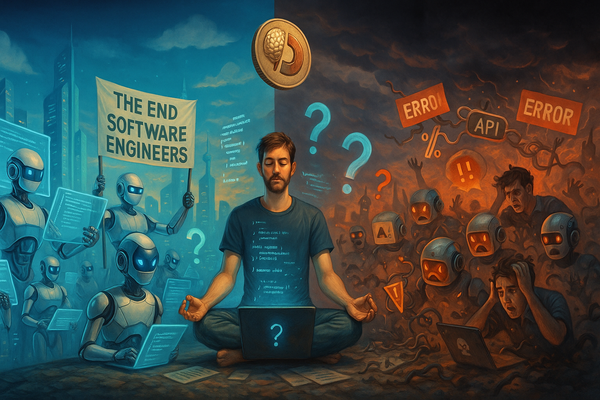The Vibe Was Unmatched: CultureCon 2025 Recap
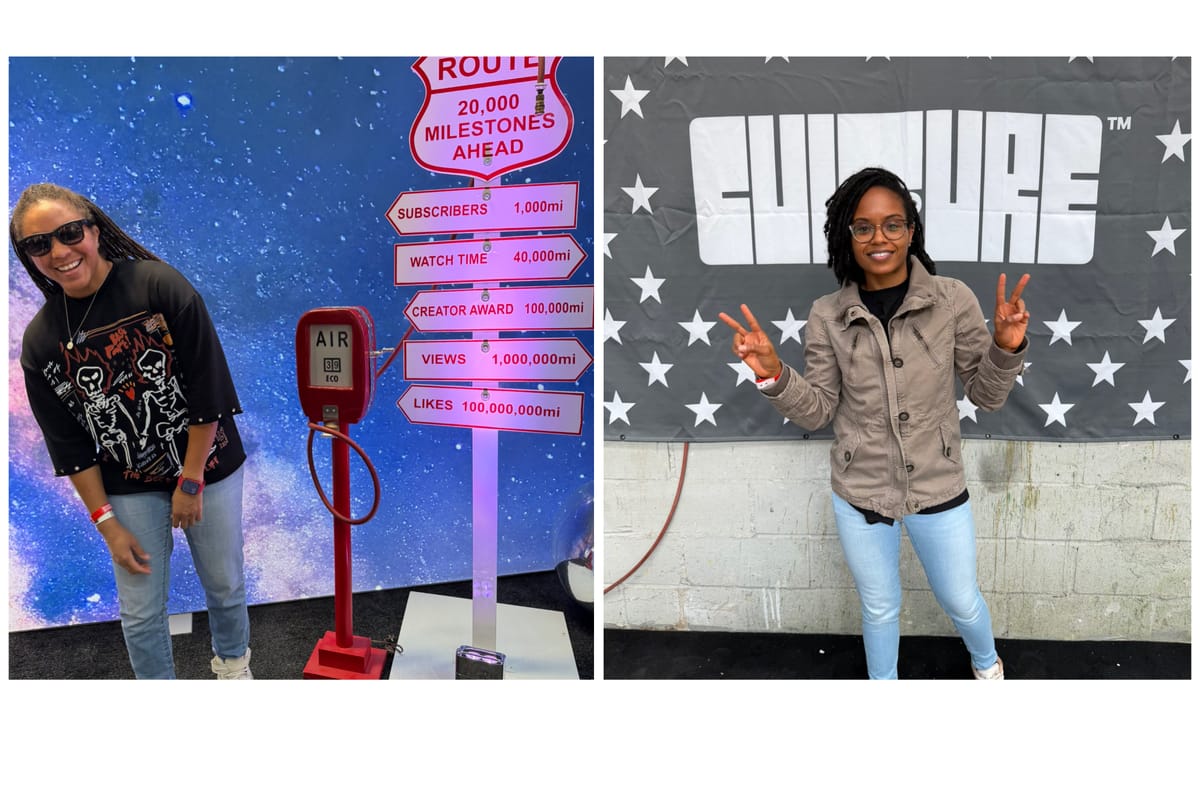
Introduction: Finding Home in Unexpected Spaces
Written with a hand from Claude.
I don't consider myself to be a content creator—at least I didn't until I started showing up at tech conferences and people stopped me by saying "Stats on Stats Podcast" as opposed to my actual name. There was also that one time I was introduced as a YouTuber. That one still makes me laugh.
The truth is, I always thought of myself as a tech professional with a pretty mid podcast. Nothing fancy. Just conversations. The goal has always been simple: interview tech professionals, cybersecurity experts, founders—people doing the work—in a way that feels totally casual, a little bit unserious, yet genuinely valuable to those trying to break into the industry. It's a space where we get to introduce listeners to some of the top people in their fields without all the pretense, while also showing that these experts are real humans who are open to connecting. We're essentially removing that awkward moment of cold-messaging someone on LinkedIn by giving people a conversation starter: "Hey, I saw you on the Stats on Stats Podcast, and I would love to connect."
But somewhere along the way—between the conference badges, the podcast bookings, and yes, people recognizing the show before recognizing me—I had to accept reality. Reluctantly. We are content creators.
Once I made peace with that label, things shifted. We started diversifying where we showed up. We went from exclusively attending tech and cybersecurity conferences to mixing in creative networking opportunities. CreatorFest. SXSW. We even plan to attend The Creators Conference in Tampa. We've been to several creator-focused events at this point, but 2025 was our first year attending CultureCon.
And CultureCon? It hit different.
Let me explain. By the time I arrived in Brooklyn for CultureCon, I had been to more conferences than I could count. On the tech and cybersecurity side: RSA, BSides, DEF CON, Blacks in Technology, HackSpace Con, Hacker Halted, RenderATL, AfroTech, blah blah blah. Each one valuable in its own way. But out of all the tech conferences, AfroTech stood out the most.
Why? Because in an industry where only 7% of professionals are Black, seeing thousands of Black tech professionals in one place feels like a unicorn sighting. More importantly—it feels like home. There's something about walking into a room and not having to explain yourself, not having to code-switch, not having to be "the only." You just get to be.
So why am I talking about AfroTech when this discussion is about CultureCon? Because vibe-wise, CultureCon reminded me of AfroTech in all the best ways.
Most of the conferences I've attended—tech or creative—tend to attract a pretty homogeneous crowd. You know the one. What’s understood don’t need to be said, fr. Nothing wrong with that, but it's exhausting being one of the few. Conferences like AfroTech and CultureCon feel like permission slips to take up space unapologetically. To be loud. To be seen. To belong without question.
CultureCon was created for creatives. The panels featured people like Michael Ealy, Ciara, Jennifer Hudson, and the casts of shows like Reasonable Doubt and Bel-Air. On the surface, you might think: what does this have to do with IT professionals? With cybersecurity analysts? With people grinding in tech?
Everything, actually.
Because here's what I learned over those few days in Brooklyn: the insights shared at CultureCon transcend the creator space. The lessons on resilience, authenticity, building community, navigating rejection, owning your voice, and redefining success? That's universal. Those conversations translate into sound advice for anyone trying to build something meaningful—whether that's a tech startup, a cybersecurity career, a creative brand, or just a life that feels honest and full.
The vibes were unmatched. Brooklyn. Music. Dancing. Black people coming together and collaborating. Panels that felt more like living room conversations than corporate keynotes. 10/10, no notes.
This recap is a collection of those conversations—or at least, the heart of them. Each section captures a panel session I attended, transformed into something you can sit with, reflect on, and carry forward. These aren't just recaps. They're immersive deep dives into the themes, stories, and wisdom that made CultureCon feel less like a conference and more like a homecoming.
Whether you're early in your career, pivoting into something new, or simply looking for permission to take up more space in your own life, these pages are for you. The voices you'll encounter here—actors, creators, visionaries—may come from different industries, but their truths are your truths. Their struggles, breakthroughs, and hard-won lessons apply whether you're pitching a startup, studying for a certification, building an audience of ten, or just trying to figure out what's next.
This is about growth. It's about culture. It's about showing up as yourself—fully, loudly, unapologetically—and discovering that the things that make you different are actually your greatest assets.
So welcome. Get comfortable. Let's dive in.
The Work Before the Spotlight: A Conversation with Michael Ealy
Michael Ealy leans forward mid-sentence, his voice rising just enough to carry the weight of something he clearly needs people to understand. "I didn't skip any steps to get here," he says, each word deliberate. "I didn't skip shit."
The room—packed with aspiring creatives, young professionals, and culture carriers at CultureCon—erupts. Not the polite golf clap of a corporate panel, but the kind of affirmation that ripples through a space when someone says the quiet part out loud. Because in an era of viral moments and overnight success stories, Ealy is offering something rarer: the unglamorous truth about what it takes to build a career that lasts.
This isn't a conversation about fame. It's about craft. It's about the work no one sees—the Off-Off-Broadway theaters with thirteen seats, the background roles, the one-liners, the years of showing up before anyone knew your name. Ealy, known for his piercing blue eyes and magnetic screen presence, could easily coast on "handsome privilege" (a term the audience later teases him about). Instead, he's here to talk about discipline, research, and the kind of respect for the work that doesn't cut corners.
The Research That Becomes the Role
When Ealy discusses playing the abusive husband Beau Willie in For Colored Girls, his tone shifts. This wasn't just another role—it was one of the most challenging and emotionally taxing performances of his career. To portray a man capable of horrific violence, Ealy didn't lean into villainy for villainy's sake. He dug deeper.
He studied the medical and mental health systems that fail veterans. He researched PTSD—not just the condition itself, but the cascade of consequences when veterans can't access the help they need. "PTSD gets worse," he explains, "and then that PTSD gets passed on to the spouse. That's called secondary PTSD. And then the spouse, the one that's being abused... and the children." It's a domino effect, a cycle of pain that can swallow entire families whole.
"That whole story, to me, was a warning," Ealy says. "This could happen to any one of us."
This is the part of acting the audience doesn't always see: the actor as investigator, as empath, as witness. Ealy's job wasn't to make Beau Willie likable—it was to make him believable. And that required him to locate the humanity in a man who does the unthinkable. "You have to find a way to connect and empathize," he says. "That's my job—not to be your friend, but to be believable."
When audience members approach him and say they hated him for that role, it's a strange compliment. It means he did his job. But it also bothers him, just a little, because it minimizes the architecture beneath the performance—the research, the emotional labor, the conscious choice to step into darkness and find his way back out.
That's the balance Ealy has learned to strike: inhabiting the character fully without letting the character inhabit him. "What I do is not who I am," he clarifies. "It shapes me, but it's not who I am." It's a distinction that matters—not just for actors, but for anyone whose work demands that they give deeply of themselves. You can pour everything into what you do without pouring yourself out.
The Power of Preparation No One Applauds
There's a moment in the conversation when someone asks Ealy how he developed his artistry—the kind of magnetic, layered presence that allows him to communicate entire emotional landscapes with just a glance. His answer is almost defiant in its simplicity:
"I went to school. I studied. I didn't just show up and say, 'Hire me.' I didn't feel entitled. I put in the fucking work"
The room goes quiet, then explodes again. Because it's not the answer people expect. It's not about a mystical gift or a lucky break. It's about discipline. Ealy rattles off the work he put in before anyone was watching: background roles, day player gigs, Off-Off-Broadway productions in tiny theaters. "Theaters with thirteen seats," he says, shaking his head at the memory. "Putting up plays. That's the training ground."
He talks about the luxury of working when no one is paying attention—the freedom to fail, to experiment, to build your craft in the shadows. "When no one's watching, you're like, 'Whoo, I'm glad nobody saw that,'" he laughs. "But that will help. Those losses help shape the wins."
It's a sermon disguised as an anecdote. In a culture obsessed with shortcuts and hacks, Ealy is preaching the gospel of the grind. Not the performative hustle-culture grind, but the quiet, unglamorous work of showing up, learning, and getting better. "If you put in the work when no one's watching," he promises, "the work will be there when everyone is watching."
This is the part of the dream no one wants to post on Instagram. It's the years before the breakthrough. It's the roles that don't make it onto your reel. It's the rejection emails, the callbacks that go to someone else, the moments when you wonder if you're fooling yourself. But Ealy's point is clear: there is no skipping steps. The foundation you build in obscurity is what holds you up when the lights turn on.
Longevity Requires Boundaries
Someone asks how Ealy has maintained his career over the years without burning out or losing himself. His answer is refreshingly unglamorous: "I took my Black ass home."
The laughter is immediate, but the lesson is serious. Ealy talks about avoiding the traps that catch so many young actors—staying out too late, chasing validation in all the wrong places, letting the industry define who you are. "Trouble always finds a way to find you," he says, "so you don't have to go looking for it."
For Ealy, the key has been remembering why he started in the first place. "I never got into this so I could be famous," he says. "It's a craft. It's something I do, and I put it out there, and I hope you enjoy it. But I don't need the fame."
That distinction—between the work and the recognition—has been his anchor. He talks about realizing early on that even if he spent the rest of his life doing community theater, he could be happy. Because the joy was in the performance, not the applause. "To be able to do it at a level where you're getting paid, where your movies are going into theaters... all of that is icing," he says. "But it wasn't the defining reason."
This mindset has allowed Ealy to build a career that's sustainable. He's not chasing every opportunity or saying yes to everything that glitters. He's protecting his peace, his family, his purpose. When he talks about his wife and children, his voice softens. They're the ones who keep him grounded, who remind him that his work is just one part of who he is. "They're the ones who tell me when I suck," he says, grinning. "They keep me accountable."
The Dream Role That Taught Patience
One of the most moving moments in the conversation comes when he talks about playing Malcolm X—a role he thought had passed him by. He'd auditioned for other iterations of the story over the years. He'd watched the opportunity go to others. He'd made peace with the idea that his time had come and gone.
Then, last December, he got the call.
"That was a dream role for me," he says, his voice quieter now, reverent. "A dream that I thought had passed me."
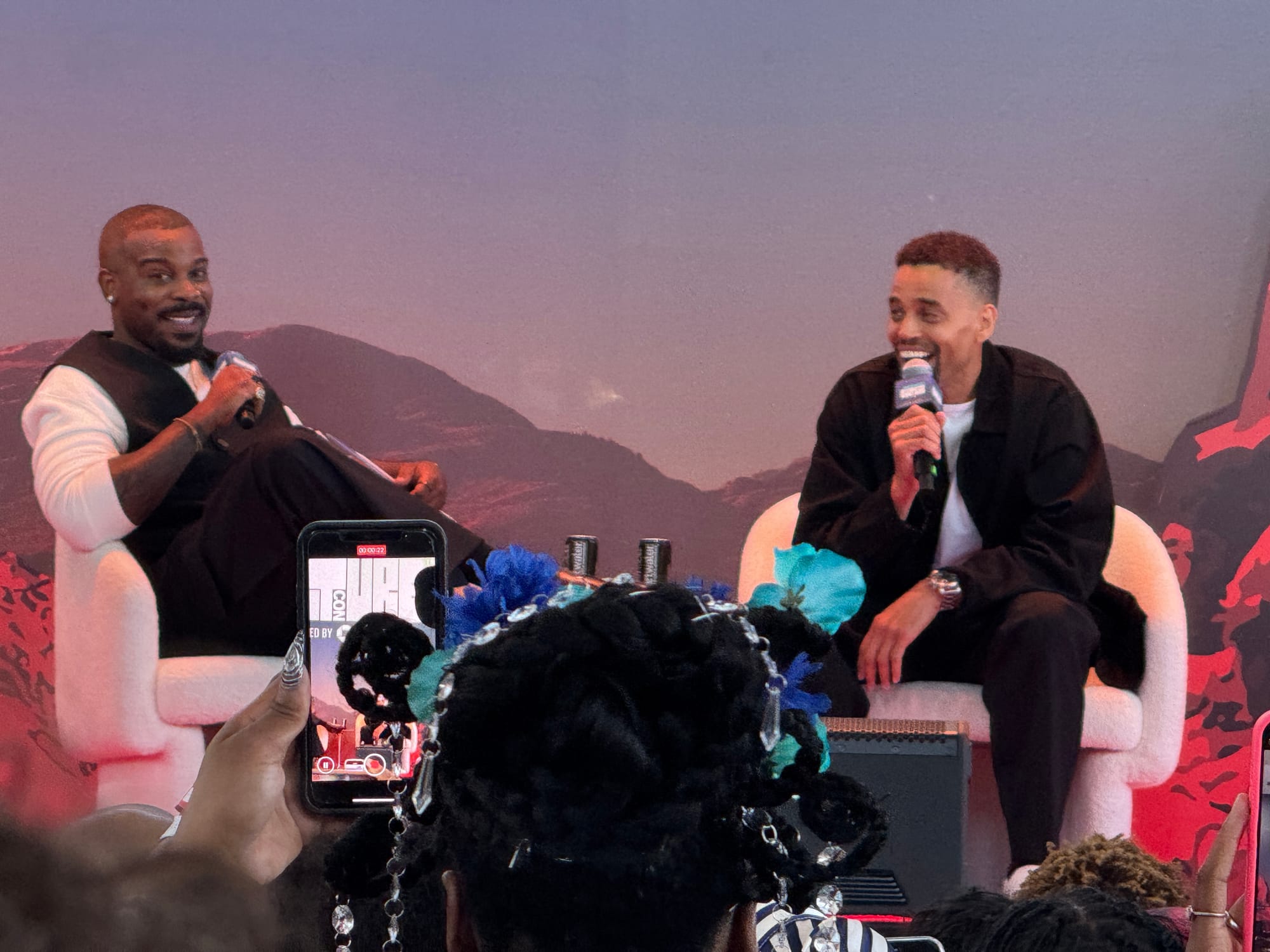
There's a collective intake of breath in the room. Because everyone knows what it's like to want something so badly it aches, to watch it slip away, to wonder if you missed your shot. And here is someone saying: sometimes the thing you thought was gone forever circles back around. Sometimes the no wasn't final. Sometimes you just weren't ready yet.
"Even when you think your time has passed to do something," he reflects, "you never know what's gonna happen."
This is not toxic positivity. It's not a promise that everything works out if you just believe hard enough. It's something more grounded: a recognition that timing is mysterious, that rejection often has nothing to do with your worth, and that the path to your dreams is rarely linear.
He tells a story about losing out on other Malcolm X projects—about being tied to another show, about the audition that never happened, about the roles that went elsewhere. At the time, those losses stung. But looking back, he sees them differently.
"I was so happy I didn't get any of those other roles," he admits. "Because I wasn't ready. Sometimes you gotta take that loss and just know something better is coming. Just maybe not in this manifestation."
It's a profound reframe: what if the closed door wasn't a punishment but a protection? What if the thing you didn't get was making space for something you couldn't yet imagine?
Keep Your Dreams Close Until They're Ready
One of the most striking moments comes when someone asks Ealy about his dream projects. He smiles, then shakes his head. "It's not something I discuss in crowds," he says, "so that someone can go buy the rights and control the product."
The room laughs, but he's serious. "Sometimes you have to keep your dreams to yourself."
It's a radical act of self-preservation in a world that demands constant transparency. Ealy talks about moving to New York and not telling anyone what he was really trying to do. He told people he was studying education, that he might teach. But privately, he was training, auditioning, learning the craft. "I didn't want anybody looking at me, telling me it wasn't going to happen," he explains.
That silence wasn't about secrecy—it was about protection. Protection from the doubt of others, from premature judgment, from the voices that would have told him to be realistic. "Sometimes you have to do that with your own family," he admits. "And that's hard. But you do what you have to do to preserve your dream."
Handsome Privilege, Handsome Punishment, and Everything in Between
The conversation takes a lighthearted turn when someone asks about "handsome privilege" and "handsome punishment"—the Internet's way of debating whether being attractive helps or hurts your career. Ealy laughs, visibly amused. "Handsome punishment?" he repeats. "There are worse things to be called."
But he doesn't dodge the question. He acknowledges that yes, he's lost roles for being "too handsome." He's also gotten roles because he was handsome enough. He's lost roles for being too light-skinned. He's gotten roles for being tall. Lost others for not being tall enough.
"It all cancels itself out," he says with a shrug. "You learn very early in acting that rejection might not be personal. It might be physical. It might be something else."
The real lesson, though, is about letting go of what isn't yours. "What's for me is for me. What's for Idris is for Idris," he says, referencing Idris Elba. "I'm gonna take mine and do the best I can. You do yours."
It's a quiet manifesto against comparison, against the toxic competition that can poison creative communities. Ealy's message is clear: focus on your own lane, do your own work, and trust that what's meant for you will find you.
Work-Life Balance Is a Journey, Not a Destination
Near the end, Ealy is asked about work-life balance—how he manages to show up fully in his career without losing himself. His answer is refreshingly honest: "Work-life balance isn't a destination. It's a journey. I'm still figuring it out."
He talks about his children, about how becoming a father opened his eyes to a "world of selflessness." His daughter, he says, has the power to shake off whatever demons he's carrying from work. "That's the incredible power of a little girl."
For Ealy, balance means putting his family first—not in a performative way, but in a real, daily way. They're the ones who hold him accountable when the lights aren't on. And in return, they give him permission to immerse himself fully in his work when the role demands it.
It's a negotiation, an ongoing practice, a constant recalibration. And Ealy is the first to admit he doesn't have it all figured out. But he's committed to the process.
Takeaways
The work you do when no one is watching becomes the foundation for everything that comes after. Your obscurity is not wasted time—it's where mastery is built.
Boundaries are not a luxury; they're a survival strategy. What you do is not who you are. Protect the person beneath the persona.
Rejection is rarely about you. It's about timing, fit, and variables you'll never control. What's meant for you will find you—sometimes years later than you expected.
Community is currency. In a world that tries to pit us against each other, the real power is in lifting as you climb and recognizing that someone else's win doesn't diminish your own.
Have fun. If you're not enjoying the process, it's not worth it. The lights will go off. The follows will fade. The only thing that endures is whether you loved the work itself.
As the session winds down, he leans back and offers one final thought: "Take pride in the fact that in this country, we define the culture. We define the culture all over the world. Nobody can take credit for that but us. You guys are the tastemakers. You guys are the ones putting it out there for the world to see."
The room erupts. Because he's not just talking about entertainment. He's talking about identity, resilience, innovation—the things that can't be taught in a classroom or bought with a budget. He's talking about showing up, doing the work, and trusting that the work will speak for itself.
Even when no one else is in the room.
What would it look like to honor the work you're doing right now—before anyone else validates it?
